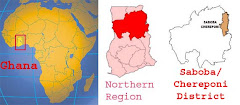Many of you may be wondering what I will be doing overseas. I know that before I left for this training I couldn't provide you with much of an explanation but now that I know a little more I will try to explain. Because the development situation in Ghana is somewhat complex, I will start by laying some background down first, followed by where I will be coming in.
Before the recent past, Ghana's government was divided into ministries that would carry out various projects similar to here in Canada. The Ministry of Food and Agriculture (MOFA) would be responsible for all projects related to food and agriculture, obviously. All the Ministries had their own responsibilities, and most projects were planned from a national level and then implemented down through the regional and district level, until finally the activities would occur at the field level.
The problem with this was that plans were being created from a national level, which didn't include the field realities and were sometimes out of touch with the real needs of the farmers. In other words, there was an information gap between the implementing bodies and the fund releasing bodies of the government. Anytime a field worker needed to get something done, approval would need to go through a beauraucratic obstacle course, until funds would be released.
So in the recent past the government has started to decentralize. Essentially this means that districts have gotten more responsibility and more freedom to meet the needs of the people. Now field workers
should be able to get the money from the district and do their projects. The districts in turn will get money from the regional office, far in advance through lump sums of money. The outcome of all this is that districts would be able to do projects quicker, with less transfers of funds, and without standardized projects and processes that omit the needs of the people, and the room for innovation.
THE PROBLEM. The districts were given this new responsibility without the funds to do it or the increase in labour to get it done. To fill that gap, large donor projects have come in. CIDA funded projects, UNICEF, and many other donors have come in to fill the resource gap. Each donor program has their own specific application process, database to fill out, and field of focus. Also, coming close to the end of the year these donors will run numerous and time-consuming training sessions that prevent the field staff from doing their jobs, that they are later held accountable for.
For example, as I understand it, if one of the field workers of the government sees that a community needs a hand washing project, they would then write a proposal to UNICEF (one of the many donor projects) to get funding. Then, if they were lucky enough to get funding, the project would be granted however with so many restrictions and conditions that it really restricts the field worker's ability to do good work. The restrictive conditions and regulations associated with the funds are ways to hold the field staff accountable to their project and
ensure success. The only problem is that it stifles all innovation and since the projects are decided from the donor level, they don't take into account the field realities.
MY JOB. My job is to work at the district level to share skills, and hopefully offer some insights into how they can improve their programming. Some of this might be in terms of implementation tools, but more likely proposal writing, computer skills, and offer some solutions to the problems they have already identified. To be perfectly honest, I am not sure exactly what their need is, but I will be serving as an outside view.
THE BIG PICTURE. I will be working with a district that is already functioning well. The big picture is that after working with that district, together we can create some tools to enhance the capacity of districts, and then those tools will be disseminated across the region in other districts. Also, Jen Hiscock, another EWB volunteer, will be working with UNICEF. This is important because as I come across frustrations at the district level because of problems higher in the food chain, I can communicate with Jen to understand more of the donor level.
This is a very vague and approximate idea of what I will be doing. I want to highlight and emphasize that my work with the district is a sharing of skills. Realistically, I have to find out what they need, and try to fill those gaps. Also, I must learn about implementation at the district level, so that hopefully we can transfer those systematic problems to the people who need to know.
Feel free to ask questions, or offer suggestions.

 ad in a different section of my blog)
ad in a different section of my blog)
 This environment is one that just compels you to work. All of us come from quite an eclectic background, and this lays the stage for some fruitful discussions. Our facilitator Levi faces a problem most facilitators dream of. Like dealing with a bunch of 10 year olds who think they know everything, none of us are capable of asking or answering a question in less than 5 minutes. Some of the simplest statements will bear a controversial and exciting discussion questioning our conditioned value set derived from societal norms.
This environment is one that just compels you to work. All of us come from quite an eclectic background, and this lays the stage for some fruitful discussions. Our facilitator Levi faces a problem most facilitators dream of. Like dealing with a bunch of 10 year olds who think they know everything, none of us are capable of asking or answering a question in less than 5 minutes. Some of the simplest statements will bear a controversial and exciting discussion questioning our conditioned value set derived from societal norms.

